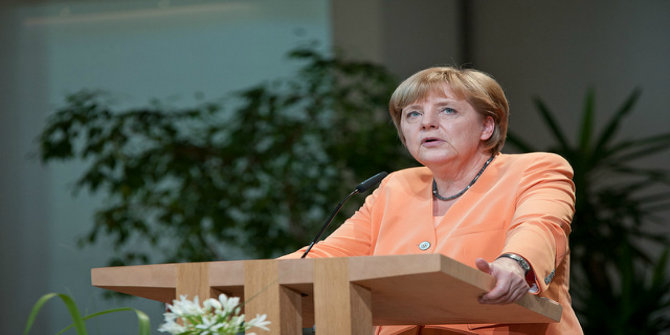Inequality and low levels of social mobility are pressing issues for England’s education system. Anne Beauvallet traces the actions of British governments to expand opportunities among pupils. She argues that while there has been continuity in the stated objectives of education secretaries since 2010, key projects have never actually been rolled out, while policy design has ignored the fact that changes in education must be implemented together with structural reforms addressing economic inequalities.
Defining inequalities in any education system is no easy task as they are numerous and interrelated. Inequalities among pupils and students in terms of family backgrounds and income levels affect educational inequalities – what is often called the ‘attainment gap’. Was the 2008 crisis a turning point in the UK government’s approach to expanding opportunities for all children to benefit from education in England?
Expanding opportunities at school level from the 1980s to 2010
Key measures – such as diversification in schools, in providers, parental choice, a focus on basics and league tables – were initiated in the 1980s and 1990s and have been systematised ever since. They reset the education agenda, putting inequalities aside until 1997, when New Labour came to power. Two initiatives in particular, Education Action Zones and Excellence in Cities, were launched in 1998 and 1999 respectively. The former consisted of clusters of schools working together to improve standards among poorer pupils.
Although the impact of the 2008 crisis was also felt in schools, the then Education Secretary Ed Balls did not implement any particular measures to address it. New Labour’s performance in terms of tackling inequalities thus appears to be mixed at best. On the one hand, as Ruth Lupton and Polina Obolenskaya pointed out, funding gradually improved for schools with higher numbers of poor students. Yet, studies on Excellence in Cities’ effectiveness showed it was limited; the fact that poorer pupils tended to do marginally better at GCSE level may be accounted for by their obtaining vocational qualifications which were accepted as GCSE equivalents rather than GCSEs themselves.
Expanding opportunities at school level from 2010 to 2017
From the start, the Conservative-Liberal Democrat coalition set the attainment gap at the top of its education policies. The Pupil Premium was initiated in December 2010: children who are in care, are or have been eligible for Free School Meals in the past 6 years are entitled to such funding, which schools can spend as they see fit.
In September 2013, Deputy Prime Minister Nick Clegg promised to grant free school meals to all pupils for the first 3 years of primary school in England from September 2014, in an effort to raise standards across the board. But the Universal Infant Free School Meals programme faced several difficulties like the lack of equipment and funding at local authority level and inconclusive evidence of the policy’s impact on achievement. The coordination of the two policies raises a further issue: as Free School Meals are available for all, parents of formerly-eligible children no longer saw the need to register, thus depriving some schools of pupil premium funding.
Conservatives Michael Gove and Nicky Morgan were in charge of education policies from 2010 to 2016: this accounts for some continuity in policies, including the focus on the attainment gap. In September 2015, the Department for Education website even launched a dedicated page titled ‘What the government’s doing about the education of disadvantaged children’, listing all measures implemented since 2010. The Pupil Premium and the Universal Infant Free School Meals were thus maintained, together with the official focus on reducing inequalities used to justify measures like free schools.
In their 2015 analysis of the government coalition’s record on schools, Ruth Lupton and Stephanie Thomson stated they could not discern any ‘Pupil Premium effect’ when studying attainment figures. As for the Universal Infant Free School Meals, in February 2016 the situation was made more complicated for small primary schools, as Cameron’s government ended extra funding that was previously available to them.
On 9 September 2016, Prime Minister Theresa Mail vowed her Cabinet would go beyond the most disadvantaged families to reach out to the ‘ordinary, working class people’. This change in policy objectives was underpinned by measures such as the continuation of the Pupil Premium and ‘opportunity areas’ first announced by Education Secretary Justine Greening in October 2016. Contrary to Conservative promises during the June 2017 general election campaign, the Universal Infant Free School Meals scheme was not phased out.
The impact of government policies since 1997
Studies on inequalities are inherently problematic: it is difficult to find long-term reliable data as inequalities in education were found to be ‘remarkably stable over time’. Besides, progress in educational participation and attainment has raised ‘measurement issues’. It may also be argued that successive governments have not resorted to structural tools to tackle economic inequalities. As John Yandell highlighted, the official discourse on inequalities in English education since 1997 has been underpinned by ‘the drive to raise aspirations’, laying the blame at the doors of the teaching profession and of the working class. The logical inference is that reforms outside education have not been part of the equation, thus inherently weakening education policies.
Contrary to the education agenda of the 1980s and 1990s, expanding opportunities for all children has been part of government policies since 1997, whatever the state of the British economy, with measures like Excellence in Cities and the Pupil Premium. Yet, the impact of such initiatives, if any, will only be felt in the long run; and they may well have been designed to make the public forget that education policies must be implemented together with structural reforms addressing economic inequalities.
Furthermore, the new emphasis on ‘meritocracy’ since Theresa May became Prime Minister in July 2016 may also signal the gradual abandonment of social objectives in favour of broader and vaguer goals. The fact remains that inequalities in English schools are a pressing issue and cannot be left indefinitely on the government’s back burner.
________
Note: the above draws on the author’s chapter in ‘Inequalities in the UK: New Discourses, Evolutions and Actions‘ (edited by David Fée and Anémone Kober-Smith).
Anne Beauvallet is Lecturer in British Studies at the University of Toulouse II.
All articles posted on this blog give the views of the author(s), and not the position of LSE British Politics and Policy, nor of the London School of Economics and Political Science. Featured image credit: Pixabay (Public Domain).







